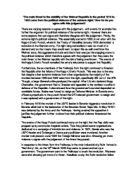The problem posed by the extreme right to the Weimar government was diminished by a lack of support from establishment conservatives in positions of political power ,and lack of support from the army. The Munich Putsch of November 1923 failed due to the lack of support from the conservative establishment for Hitler and the Nazi Party. Gustav von Kahr, Bavaria’s minister-president, denounced the putsch, with the armed police refusing to support the putsch and firing on protestors, with 16 being killed. Hitler’s entire strategy of marching on Berlin was dependent on the support of the Bavarian government and military units through Kahr, so the lack of support suffered by the Nazis from the conservative establishment diminished the problem posed by the extreme right. Also, the Kapp Putsch of March 1920 failed due to the fact that the vast majority of government bureaucrats refused to acknowledge the legitimacy of Kapp’s government or obey its orders. The army, while not crushing the putsch, failed to intervene in favour of Dr. Kapp and the right-wing extremists, suggesting that the extreme right did not have the support of the conservative-dominated army. Therefore, lack of support for Dr Kapp’s putsch directly led to its downfall. As a result, the extreme right posed a problem for the Weimar government between 1918-23 but the problem was limited in nature due to the crucial lack of support from the conservative establishment for overthrowing the Weimar government.
The extreme left posed a relatively insignificant threat to the Weimar government between 1918-23 due to the brutal response of the army and the freikorps to far left threats. The manner in which the Spartacist uprising of January 1919 was swiftly put down by the army in combination with freikorps units demonstrates how challenges from the far left during this period could easily be met by the german army. The uprising, which began on the 6th of January, was crushed by the 15th, demonstrating the speed at which such threats from the left could be dealt with. This is due to the fact that the army was a bastion of conservatism, with the officer class of the army actively displaying a vitriolic hatred for those on the extreme left. The brutality of the response by the Freikorp and the army to extreme left threats demonstrates the level of anger held by many in the army at the far left, whom they blamed for the armistice in November 1918, known as the ‘Stab in the Back’ myth. Leading communists Karl Liebknecht and Rosa Luxemberg were shot in police custody during the Spartacist uprising, and over 1000 died when the communists called for a general strike in Berlin in March 1919. In March 1920, Communists attempting to seize power in the Ruhr were brutally put down by military units, with over a thousand workers losing their lives. As a result, due to the overwhelming army response to threats from the extreme left, the communists posed a relatively insignificant threat to the Weimar government.
Also, in combination with the reliable army response to communist threats, the extreme left lacked enough general support among the german people for a credible threat of revolution, which diminished the problem posed by the extreme left for the Weimar government. Electoral support for the Communist Party never grew to more than 15% during this period, which suggests that the extreme left never garnered enough support to credibly threaten the Weimar government. The most powerful lever of influence for the communist party was the mass mobilisation of the labour movement through stikes, but the only two successful examples of mass action were those mobilised by the government, not the communists, in 1920 during the Kapp Putsch and 1923 during the occupation of the Ruhr, in order to protect the republic. Whilst the 50,000 strong Red Army that was created in the Ruhr in March 1920 during the attempted communist revolution may appear to give the communists a large base of support, Germany had 60 million inhabitants at this time so 50,000 was a very small minority. Even within the supposed 50,000 strong army, there were only 11,000 rifles, suggesting that the new ‘Red Army’ posed little threat to the government and therefore couldn’t be considered a significant problem for the government. Therefore, the communists lacked sufficient support among the german people to pose a significant threat to the Weimar Government.
In conclusion, the problems posed by the extreme right and extreme left were relatively insignificant. The extreme right, while posing a problem due to the fact that there was a possibility it might garner the support of the army, was fundamentally a weak force in the early years of the Weimar Republic due to the fact that conservatives in positions of power such as Gustav von Kahr, Minister-President of Bavaria, refused to back any attempt at overthrowing the Weimar government. However, the possibility of the army turning on the government made the extreme right a greater problem than the extreme left, which would be reliably crushed by the army.
Level 5 - Wow. A really strong essay. You have remained analytical throughout, focused on the question in every paragraph, and made sure to link all the ideas back to the question using wording from the questioning at the end of your paragraphs. Your own knowledge of the events is strong, and used in a way to support the argument you are making, and not simply to tell the story. One small point I would like you to build upon is the role of the army. You say in your main argument that both left and right are insignificant, but then hint at how the role of the army is significant in the body of the essay. I would discuss this institution, alongside the judiciary and lack of punishment for political assassinations, to build upon this concept that the right remained a lingering problem that was difficult to deal with. However, still a really strong essay. Well done.








